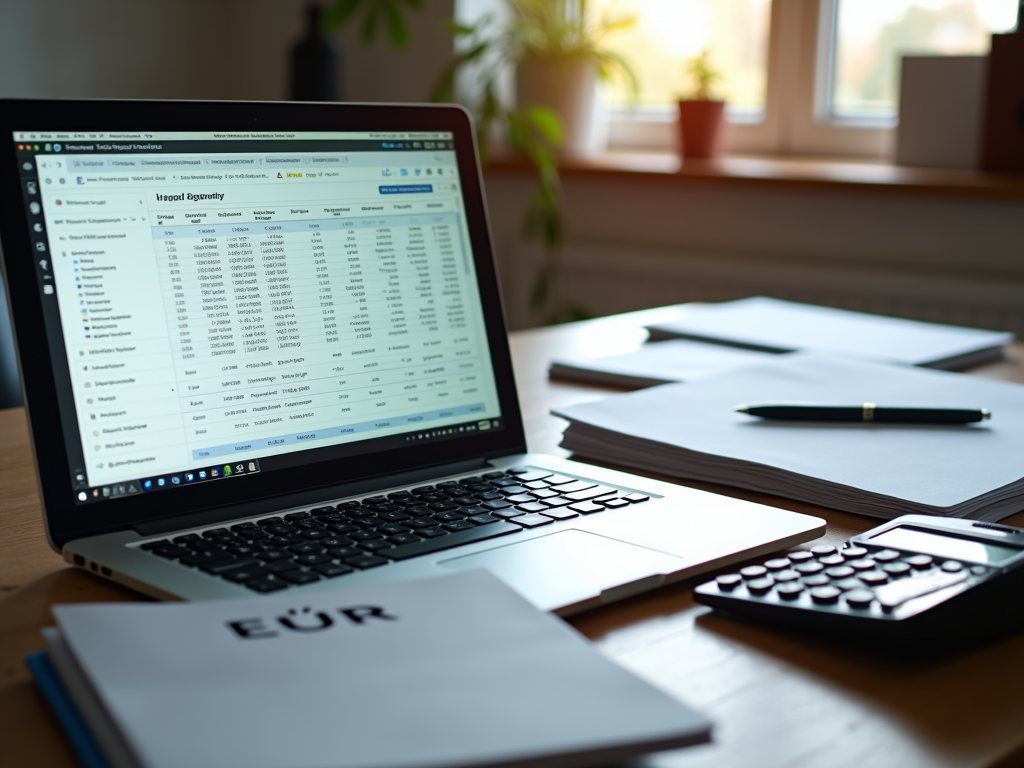For self-employed individuals and freelancers in Germany, the income tax declaration is an inevitable process that offers not only obligations but also opportunities to optimize financial situations. From simplified accounting to sales taxes and trade tax, this guide illuminates the essential aspects to consider. Each chapter provides more detailed insights into specific requirements and strategies to maximize one’s income tax declaration.
Masterful Income Determination: Understanding and Applying Simplified Accounting

Self-employed individuals and freelancers often face the challenge of managing their financial matters efficiently, especially when it comes to determining taxable income. Here, simplified accounting (EÜR) proves to be an indispensable tool. This simplified method for income determination is particularly suitable for small businesses, freelancers, and small entrepreneurs as it is based on the cash and payment principle. Revenues and expenses are recorded only when they are actually paid.
Unlike regular accounting, there is no obligation to maintain double-entry bookkeeping, significantly reducing the administrative burden. The EÜR is ideal for freelancers and small enterprises with a turnover of up to 600,000 euros and an income of up to 60,000 euros per year. There are no restrictions on turnover or income for freelancers, providing numerous possibilities for application.
The core of the EÜR consists of comparing commercial revenues with business expenses. Revenues include both taxable and tax-exempt income, withdrawals of goods, and private use of business assets. On the expense side, there are costs such as merchandise purchases, services, payroll expenses, depreciation, and various insurances.
The most significant advantage of the EÜR is its simplicity: it avoids complex and costly double-entry bookkeeping. This opens up a flexible and time-saving way for small businesses to keep track of their finances. Additionally, it allows for a clear separation between personal and business finances, which is particularly advantageous for freelancers.
The EÜR is legally anchored in Article 4, Paragraph 3 of the Income Tax Act (EStG). It represents a recognized method for income determination, as long as the legal limits of turnover and income are not exceeded. Presenting the EÜR as an attachment to the income tax declaration (attachment EÜR) can be particularly advantageous for small entrepreneurs opting for the small business rule.
For the creation of the EÜR, self-employed individuals should use tested accounting software to increase efficiency and minimize errors. A comprehensive collection of documents is essential, as these documents serve as proof for all revenues and expenses. Carefully follow the cash and payment principle to always accurately represent the tax situation.
In summary, the EÜR offers a easily implementable and efficient method for income determination for small businesses and freelancers who are not required to maintain complete accounting. This method allows for a comprehensive overview of the company’s financial health while minimizing the administrative burden.
Sales Tax and Trade Tax: The Guide for Self-Employed Individuals

The complex world of taxes is like a jungle for many self-employed individuals and freelancers to navigate. Two of the main obstacles along the way to a successful income tax declaration are the sales tax and the trade tax, both with different requirements and conditions.
Sales Tax – The Heart of Taxation for the Self-Employed:
The sales tax in Germany is a consumption tax that applies to the sale of goods and services. It exerts its full effect as it is borne by the end consumers, while self-employed individuals must regularly pay this tax to the tax agency. A significant relief is offered by the small business rule, which allows entrepreneurs who had a turnover of less than 25,000 euros in the previous year and who remain below 100,000 euros in the current year to be exempt from the VAT obligation. The standard VAT rate is 19%, with a reduced rate of 7% for certain products, such as food or cultural events.
A central point in managing sales tax is the advance declarations which depend on the anticipated tax revenues. These must be submitted monthly, quarterly, or even annually. Correct and timely recording protects against unnecessary demands from the tax agency.
Trade Tax – The Tax Obstacle for Entrepreneurs:
In contrast, trade tax, a profit-based tax, is specifically imposed on profits derived from commercial activities. While freelancers are exempt, merchants must pay this tax to the municipality. However, sole proprietorships and partnerships can benefit from an exemption of 24,500 euros. Anything exceeding this amount is subject to the rate established by the municipality, thus constituting an additional administrative point to keep under control for entrepreneurs.
A benefit of the trade tax is its deductibility from income tax. This can reduce potential double taxation, thus decreasing the financial burden.
Tax Tips for Worry-Free Tax Everyday Life:
The key to efficient tax management lies in accurately documenting all expenses relevant to the business. These can be listed as business expenses, forming the basis for tax reduction. Investing in qualified tax advice also helps navigate the maze of paragraphs and fully exploit tax advantages.
In summary, sales tax and trade tax are two central aspects of entrepreneurial obligations in Germany. Careful and informed management of these taxes requires more than just a superficial glance at the numbers; it is an ongoing task that can prove fruitful when approached wisely.